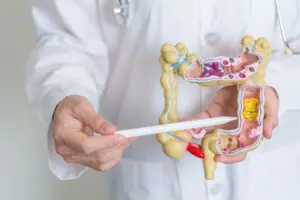
Acid reflux vs. GERD: Have you ever felt a burning sensation in your chest after eating or while lying down? That’s most likely acid reflux. But what about GERD? Is it the same thing or something more serious? While many people use the terms interchangeably, they aren’t the same. This guide will help you understand the difference between acid reflux and GERD and what you need to know about both.
What is acid reflux?
Acid reflux happens when stomach acid flows back up into the oesophagus. At the end of the oesophagus, there’s a small valve called the lower oesophageal sphincter, which normally closes after food reaches the stomach. If this valve doesn’t shut properly, acid can move upward, causing the familiar burning sensation known as heartburn.
Also Read | Do you have acidity often? These 8 habits might be why
Common symptoms of acid reflux include a burning sensation in the chest, bloating, frequent burping, and even difficulty swallowing. It’s often triggered by eating large meals, lying down too soon after eating, or consuming spicy and fatty foods.
What is GERD?
GERD stands for gastro-oesophageal reflux disease. It’s a chronic form of acid reflux. If you experience acid reflux symptoms more than twice a week, or if they are severe and persistent, you might have GERD. So while acid reflux can happen to almost anyone, GERD is more serious and long-lasting. Signs of GERD include frequent heartburn, chest pain, a constant sore throat or hoarseness, trouble swallowing or feeling like food is stuck.
What causes acid reflux and GERD?
The underlying cause of both acid reflux and GERD is the same: stomach acid flowing where it doesn’t belong. But certain factors can trigger or make these problems worse. These include overeating, eating too quickly, spicy or fatty foods, caffeine, alcohol, smoking, obesity, pregnancy, and even some medications.
In people with GERD, the issue is often linked to a weakened or damaged lower oesophageal sphincter (LES). When the LES doesn’t close, acid can escape back into the oesophagus more often and more severely.

Why does the difference matter?
GERD can cause more serious health issues if left untreated. When acid frequently flows back into the oesophagus, it can damage the lining over time. This may lead to inflammation, narrowing of the oesophagus, and long-term discomfort. That’s why frequent heartburn or reflux shouldn’t be ignored.
Also Read | 10 simple tips to prevent acidity
Occasional acid reflux is common and usually harmless, but GERD is more persistent and requires medical attention to prevent lasting damage. However, both conditions can often be managed with simple lifestyle changes. If you’re noticing symptoms, visit a medical expert to protect your digestive health.








